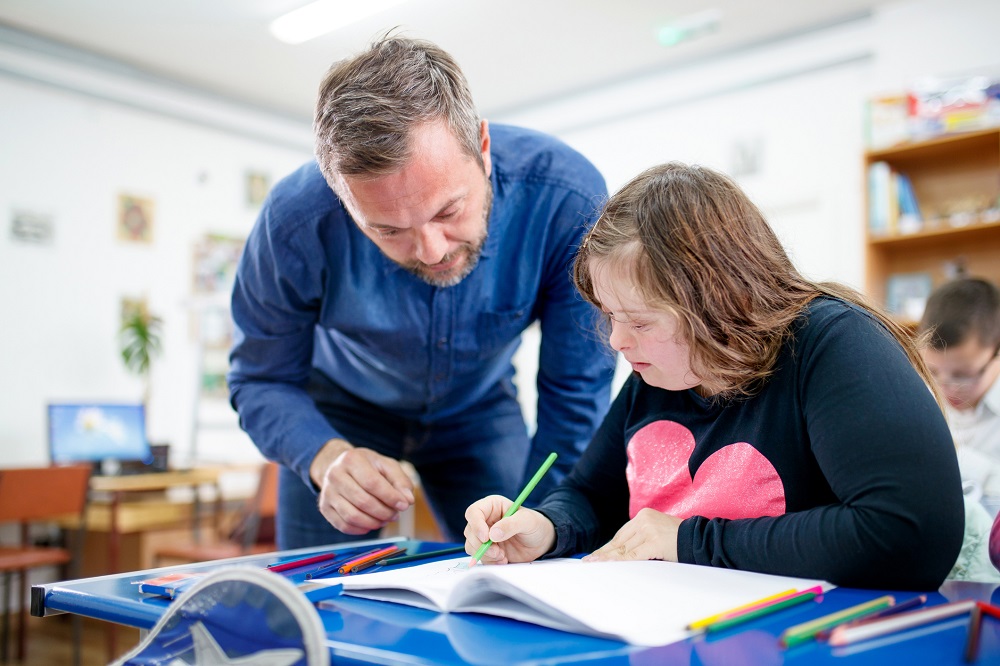Challenges like exam stress, squabbles with friends and the pressure to fit in can all make school seem hard for young people. But there are lots of things you can do to support them and help them get the most out of school. Here you’ll find information and advice to help you support and reassure them.
Tips for supporting your teen's learning
Tip #1: Show an interest
Your teen may find it encouraging if you show an interest in what they’re learning at school. Without being pushy, try asking them about their studies. You don’t need to pretend to understand everything – they may enjoy telling you things you don’t know! If they get into the habit of talking to you about their day, they may find it easier to tell you if anything upsets them.
Our page on talking and listening to your teen has lots of tips to encourage your teen to confide in you.
If you want to know a bit more about what your teen is studying to help start a conversation, you can find out more about the curriculum on the Parentzone Scotland website.
Tip #2: Encourage them to make the most of school
Even if your teen isn’t keen on studying, school offers much more than lessons. So try to encourage them to make the most of this. For example, you could suggest they join a club – music, sport, art, drama, film, coding, gaming, volunteering, campaigning, getting outdoors – there’s bound to be something that sparks their interest.
Tip #3: Help them establish a routine
Having a study routine that balances school and homework with fun and relaxation, exercise and plenty of sleep could help your teen feel more in control. Have a chat with them and help them work out a routine that suits them. For example, you could suggest setting aside a regular time for schoolwork, keeping one night homework free or moving mealtimes to fit their schedule better.
You could also encourage them to think about their bedtime and morning routines on school days. For example, packing their bag, laying out their clothes and charging all their devices the night before will make the morning much easier.
Tip #4: Help them find their study style
Different people learn in different ways, and the way your teen learns best may not be the way you learn best. This quiz from the Open University helps you work out your study style – you could both try it together and compare results!
You can find more tips for supporting your teen’s study on the Parentzone Scotland website.
Tip #5: Give them space
You know your child best, and you’ll know when they need some encouragement, and when they need to be left alone to get on with things. Make sure they have time and space to do homework. This may involve keeping younger siblings busy so your teen can concentrate – our activities and games pages have lots of suggestions for this.
Tip #6: Let them relax
Nobody can work round the clock, so make sure your teen also has time to relax and recharge their batteries. Try to help them get a good balance between work and play.
Tip #7: Support them to step away from their screens
Many teens will be using phones, tablets or laptops to study and to relax and have fun, which may mean they don’t have much time away from their screens. So it’s a good idea to encourage them to log out every so often and do something different, like go for a walk, meet a friend or listen to music.
Tip #8: Encourage them to get plenty of sleep
Teenagers’ body clocks are naturally programmed to staying up late and sleeping in in the morning – which isn’t very helpful when they need to be up for school. But there are things you can do to help them relax in the evenings and get a good night’s sleep. You can find more sleep tips here.
Tip #9: Remember to praise them
It’s not all about getting good grades, so make sure your teen knows you’re proud of them by praising them for working hard, trying new things and learning from their mistakes. This will help boost their confidence and encourage them to keep trying.
Tip #10: Try not to compare them
It can be really disheartening for teens to be compared to their brothers or sisters or other people in their school. So try not to say things like ‘When your brother was your age…’ or ask how their friends did in tests.
Tip #11: Put your magic wand away
From arguments with friends to problems with their work, your teen will probably face various challenges at school. And while it can be tempting to try and solve their problems for them, if you support them to solve their problems themselves this will help them far more in the long run.
Setbacks and challenges and stressful situations are a normal part of everyday life. On the whole, the more we face the things which make us feel uncomfortable, the easier it’ll get as we become more resilient. So try and help them find solutions themselves by talking it through with them, and breaking down big tasks into manageable steps. Our page on helping teens build resilience has more advice.
Tip #12: Help them deal with stress in a positive way
It may sound harsh, but don’t feel you have to protect your teen from everything that might make them feel stressed. A little bit of stress can actually be a good thing. It can help us focus and it can energise us to meet challenges (like studying for tests) and to carry on when we get stuck.
So a great way to support your teen is to help them learn to recognise when they’re feeling stressed or anxious and encourage them to talk about their worries – this might be enough to help them feel better. You can then try to help them find a way to cope with their feelings. This could be by getting some fresh air or relaxing, or by preparing for the event they’re worrying about so they feel more ready to face it. Our page on supporting your teen’s mental health has more tips.
Tip #13: Keep an eye out for signs they may be too stressed
Sometimes as parents it can be hard to tell the difference between normal nervousness and more serious symptoms of stress or anxiety. Here are some signs to look out for:
- they seem moody, emotional or teary, or easily upset
- they talk about themselves in a negative way, for example, saying that they’re stupid or a failure
- they can’t focus on their work
- they’re irritable or short-tempered
- they have physical symptoms, like feeling sick, shaky, sweaty, breathless or dizzy, or getting break-outs of spots and other skin conditions
- they aren’t sleeping well
- their appetite or eating habits change.
If you spot any of these signs, it’s a good idea to have a chat with your teen to try to uncover what’s wrong. If the symptoms don’t go away, you may need to consider getting further support, for example, by talking to the school or your GP.
Our pages on teen behaviour – what’s typical and what’s a warning sign? and supporting teens with low mood and depression have more information and advice and you can find organisations offering advice and support here.
Keeping in contact with the school
Schools aren't just there for students – they're there for you too. So if your teen feels overwhelmed by the amount of work they're being set or is struggling with their work or any other aspect of school, or if you have worries about their mental or physical health, you can always contact their school for advice – they’ll be happy to help and support you both. You can start by talking to your child’s class or form teacher, head of year, or guidance teacher.
You may find the idea of contacting the school daunting – particularly if you have unhappy memories of school yourself. But please remember that the school is there to help your child become the best they can, and will want to help with any issues that arise .
It can help to keep a record of when you’ve contacted the school and what was said – you could jot things down in your calendar or in a notes app on your phone. If you’re worried about meeting with the school, you can ask a friend or family member to come with you.
Bullying
If your child is being bullied by someone at their school, it’s important to contact the school to try and resolve the situation. Our section on bullying has lots of information and advice to help you support your child.
Online safety
It's important to consider how you can help keep your teen safe online. Most people, especially teenagers, will be online more than ever – which isn’t a bad thing. It lets them keep in touch with their friends, have fun and supports their learning outside of school. But at the same time it's important that you know that they're safe while online. Our online safety section has lots of advice to help you.
Exams and the future
Our section on coping with exams has lots of advice and information on how to help them deal with exam stress, revision tips and what to do once the results are in.
Further information
You can find useful information on supporting your teen's learning on the Parentzone Scotland website, including advice on preparing for assessments.
 Activities & Play
Activities & Play Behaviour
Behaviour Childcare
Childcare Development & Growing Up
Development & Growing Up Family, Friends & Relationships
Family, Friends & Relationships Feeding Your Baby
Feeding Your Baby Food & Eating
Food & Eating Health & Safety
Health & Safety Mental Health & Wellbeing
Mental Health & Wellbeing Money & Work
Money & Work Online Behaviour & Safety
Online Behaviour & Safety Pregnancy & First Days
Pregnancy & First Days School & Education
School & Education Sleep
Sleep











 Online Behaviour & Safety
Online Behaviour & Safety
 Childcare
Childcare